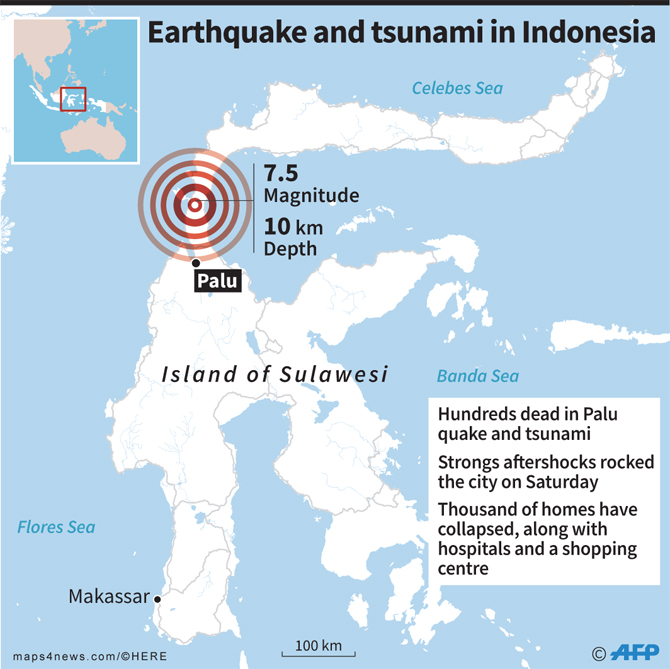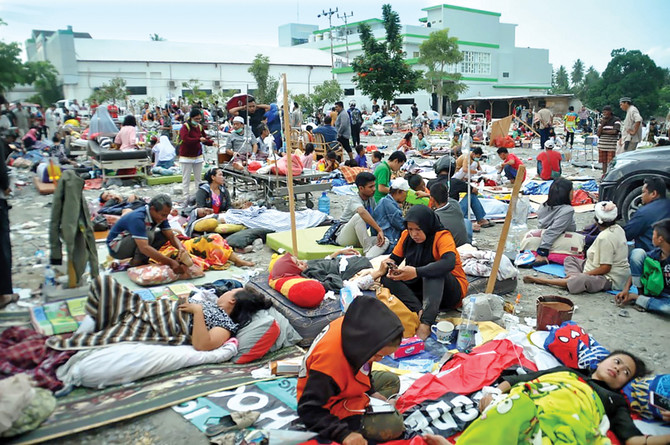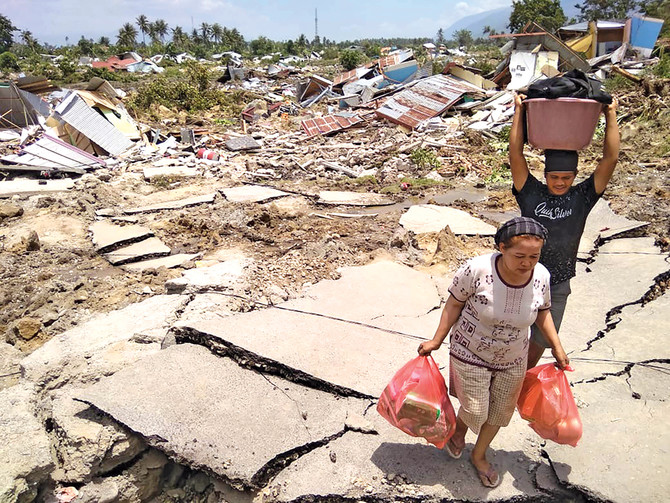JAKARTA, Indonesia: Indonesian officials on Saturday said the true extent of the devastation caused by a 7.4-magnitude earthquake that struck Central Sulawesi province the previous day was worse than earlier thought.
Sutopo Purwo Nugroho, the spokesman of Indonesia’s National Disaster Mitigation Agency, said in a news conference on Saturday that the quake and a subsequent three-meter-high tsunami had killed 384 people and injured more than 500. Twenty-nine were missing and hundreds of buildings had been destroyed, while 16,732 people had been displaced.
The figure only counted casualties in Palu, the provincial capital city with a 367,000 population, where residential houses, shopping malls, hotels, hospitals and other buildings collapsed or were badly damaged, and it is estimated that hundreds of people are still trapped under the ruins.
“The iconic Ponulele Bridge in Palu that connects West Donggala and East Donggala collapsed after it was hit by the tsunami,” Nugroho said.
One of the people killed in Palu was 21-year-old Anthonius Gunawan Agung, an air traffic controller in Palu’s Mutiara Sis Al Jufri Airport who stayed behind in the swaying, cracking tower when his colleagues were fleeing for their lives.

“When the quake struck, he was giving clearance for Batik Air flight 6321 bound for Makassar to take off and he waited until it was safely airborne before leaving the ATC cabin,” said Yohannes Sirait, spokesman for Air Navigation Indonesia.
“After the flight was airborne, the quake was getting stronger so Agung decided to jump out of the cabin tower on the fourth floor, but he broke his legs,” Sirait added.
Agung was taken to hospital for medical attention but early diagnoses showed he had suffered internal injuries and the doctor referred him to a bigger hospital.
Sirait said the company had prepared to deploy a helicopter from Balikpapan in East Kalimantan across the Makassar Strait to transport Agung out of Palu.
“Due to the damages on the airport runway, we could only deploy the helicopter on Saturday morning, but he passed away before the helicopter arrived,” Sirait said.
The Palu airport runway is partially damaged with only a 2,000-meter runway intact and the other 250 meters broken. The airport is now closed for commercial operation and open only for aircraft carrying humanitarian assistance. It is scheduled to start serving commercial flights again on Oct. 4.
“We are deeply saddened by his passing. Agung had showed a great dedication to serve and ensure flight safety. We are honoring him by promoting him two ranks posthumously,” said Novie Riyanto, director of AirNav Indonesia.
The number of casualties in Donggala, a neighboring coastal district which is one of the hardest-hit areas, and other areas whose access is cut by damaged roads, landslides, and collapsed or broken bridges are still unaccounted for with communication network still scarce.
“We expect the number of casualties to rise as authorities are still trying to reach other areas hit by the tsunami,” Nugroho said. The province was hit by two powerful earthquakes on Friday. The first one, of 6-magnitude, struck at 2 p.m. at a depth of 10 kilometers and the 7.4-magnitude quake shook three hours later. The tsunami swept Talize Beach in Palu and the coastal areas of Donggala about 25 minutes after the quake struck, Nugroho said. Tatura Mall, the biggest shopping mall in Palu, has collapsed while the eight-story Roa-Roa Hotel has been flattened to the ground. “The hotel had 80 rooms and 76 of them were occupied,” Nugroho said. 
Amateur footage broadcast on national TV showed the devastation in Mamboro, a fishing village flattened to the ground by the giant wave, and some fishing vessels were swept inland.
Indonesia's president on Friday night said he had instructed the security minister to coordinate the government's response to a quake and tsunami that hit central Sulawesi.
Joko "Jokowi" Widodo also told reporters in his hometown of Solo that he had called on the country's military chief help with search and rescue efforts.
UN spokesman Stephane Dujarric said UN officials were in contact with Indonesian authorities and "stand ready to provide support as required."
Indonesia is prone to earthquakes because of its location on the "Ring of Fire," an arc of volcanoes and fault lines in the Pacific Basin.
On Aug. 5, a powerful quake on the island of Lombok killed 505 people, most of whom died in collapsing buildings. Another series of strong quakes in mid-August killed at least a dozen on Lombok and neighboring Sumbawa island.
In December 2004, a massive magnitude 9.1 earthquake off Sumatra in western Indonesia triggered a tsunami that killed 230,000 people in a dozen countries.


























